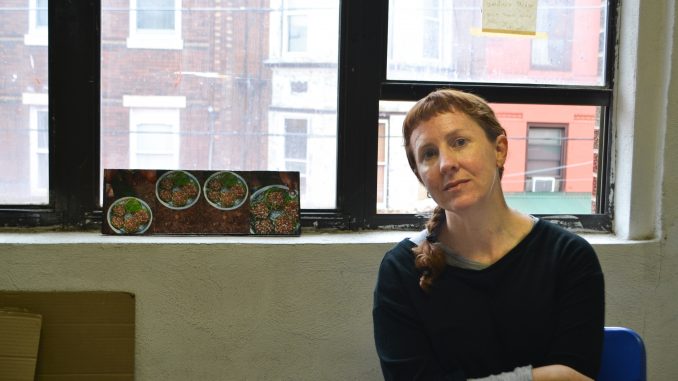
A construction and demolition waste recycling company in Northeast Philadelphia is the new studio for two alumnae.
Maria Möller, a master’s of acting alumna, and 2016 master’s of glass alumna Kristen Neville Taylor are two of the six artists chosen for the Recycled Artist in Residency 2017 program. RAIR is a nonprofit that creates awareness about sustainability and conservation issues by using recyclable materials to create art.
The center offers two types of residencies: the standard option, which lasts one to three months and offers the artist studio space, and the “biggie shortie,” which lasts two to four weekends and gives the artists partial access to the shop and studio.
During both programs, artists have access to more than 350 tons of waste, woodshop materials, handheld power tools and metalworking equipment, said Billy Dufala, the director of residencies at RAIR.
Neville Taylor will start the standard residency program in September. She plans to analyze waste to determine commonly thrown-away items and find their value.
“I’ve been taking objects and potential artifacts of value, crushing them into small pieces and sculpting them into a sphere,” Neville Taylor said. “So that these objects could not be placed into categories easily, like they are before they’re crushed.”
Möller will complete the “biggie shortie” residency. She said she will focus on her idea for a project named “One Last Time,” which will use material found at RAIR to speak on questions of mortality.
Möller’s goal is to engage people who are close to the experience of mortality, meaning participants could be someone who has suffered a loss, a sick person or an older person. She’ll take objects she found at RAIR and consider what it would do one last time — things that would give it purpose and satisfaction, she said. Möller will photograph the objects with input from the participants and then return it to the center. The photos will be accompanied by a recorded conversation between Möller and the participants about mortality and loss.
“As I get older, I’m dealing with people in my life, parents and relatives, starting to pass or taking illness,” Möller said. “It’s kind of a meditation on mortality, and the privilege that some people get as they’re approaching the end of knowing and having the chance to do something one last time.”
After working in theater for 25 years, Möller began to transition from performance to creating socially engaged and conceptual projects that often involved photography.
She started acting when she was a child, and left high school a year early to pursue theater before co-founding the theater company Shakespeare in Clark Park in 2005.
“After working in theater for so long, I felt the change to be exciting and fulfilling on a personal, creative level,” Möller said.
Before Dufala co-founded RAIR in 2010, he used materials he collected from dumpsters and the street for his artwork. Dufala said the facility helped him and other artists access these materials and equipment more easily.
He added that the program is a way to educate the arts community about how waste is produced.
“It’s an absolute no-brainer that this is a very viable resource in a city like Philly for the arts community,” Dufala said.
Dufala said he has high hopes for RAIR’s 2017 residents, and he looks forward to seeing what Möller and Neville Taylor produce during their time with the nonprofit.
“I’m really excited,” Möller said. “I’ve been there on a few different occasions and always have wanted to spend that time there, to literally be able to dig a little deeper, in the trash.”
Henry Savage can be reached at henry.savage@temple.edu.
CORRECTION: This article previously misstated how long Maria Möller has practiced photography. She has practiced photography since 1996. It also misstated the Möller’s ideas for “One Last Time.” The project will involve participation by people who are close to the experience of mortality. The objects will be removed from RAIR, photographed and returned to the recycling center.


Be the first to comment